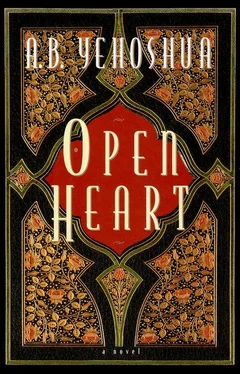A. Yehoshua - Open Heart
Здесь есть возможность читать онлайн «A. Yehoshua - Open Heart» весь текст электронной книги совершенно бесплатно (целиком полную версию без сокращений). В некоторых случаях можно слушать аудио, скачать через торрент в формате fb2 и присутствует краткое содержание. Год выпуска: 2014, Издательство: Peter Halban, Жанр: Современная проза, на английском языке. Описание произведения, (предисловие) а так же отзывы посетителей доступны на портале библиотеки ЛибКат.
- Название:Open Heart
- Автор:
- Издательство:Peter Halban
- Жанр:
- Год:2014
- ISBN:нет данных
- Рейтинг книги:3 / 5. Голосов: 1
-
Избранное:Добавить в избранное
- Отзывы:
-
Ваша оценка:
- 60
- 1
- 2
- 3
- 4
- 5
Open Heart: краткое содержание, описание и аннотация
Предлагаем к чтению аннотацию, описание, краткое содержание или предисловие (зависит от того, что написал сам автор книги «Open Heart»). Если вы не нашли необходимую информацию о книге — напишите в комментариях, мы постараемся отыскать её.
Open Heart — читать онлайн бесплатно полную книгу (весь текст) целиком
Ниже представлен текст книги, разбитый по страницам. Система сохранения места последней прочитанной страницы, позволяет с удобством читать онлайн бесплатно книгу «Open Heart», без необходимости каждый раз заново искать на чём Вы остановились. Поставьте закладку, и сможете в любой момент перейти на страницу, на которой закончили чтение.
Интервал:
Закладка:
The Indians sitting around the fire apparently sensed that I was making my way toward them, and they started getting up to welcome me, but also to prevent me from approaching the pyre and desecrating the sacred rite by my alien presence. Judging by their attire, they were urban Indians of quite a high class, and they behaved with both firmness and tact. They surrounded me, putting their hands together on their chests in the traditional greeting, apparently intent on barring my way. I joined my hands in an imitation of their gesture, to signal my sympathy and good will, and then I felt someone touching me lightly. It was my rickshaw driver, who had secretly followed me to see that I didn’t get into trouble. He spoke favorably of me to the people, but he too tried to prevent me from approaching the pyre, which was burning brightly and cheerfully, as if nothing was lying on top of it. I took the knapsack off my back and sat down on a big, damp boulder. The remnants of the river were gurgling nearby, and the night was cold and misty. Now that the Indians saw I had given up any intention of breaking through to the fire itself and had seated myself to one side, they calmed down, and one of them offered me a cup of scalding tea, perhaps as a sign of thanks for my restraint. I took the cup gratefully, but before I raised it to my lips I saw in astonishment that the body lying wrapped up next to the pyre and waiting to be burned was not yet dead but that of a mortally sick or dying man, who had apparently been dragged here in order to die in the right place. Every now and then someone would bend down to examine him, to stroke him, or to whisper to him, to encourage him with hopes for the waiting fire. Now I understood why they had been so insistent about barring my way. I could no longer drink the tea, and after a while, when the sound of an airplane overhead made all heads turn upward, I quickly poured the yellowish liquid onto the ground. Bright red lights now appeared in the mist, and a large old plane, whose propellers made a pleasant purring sound, came down very low, right over our heads, and continued flying along the riverbed until it landed. The Indians began talking about this night flight from New Delhi, which stopped at Gaya and went on to Patna and Calcutta. “Calcutta?” My excitement flared. They all knew the old plane and spoke affectionately about the night flight, which in an hour or two would take off for Patna and would reach Calcutta at dawn. Without another moment’s hesitation I stood up, returned the empty cup, and said to my driver, who was sitting there in his tall turban, looking pleased with himself and drinking his second cup of tea. “Take me quickly to the airport. I want to go to Calcutta.” “No chance,” he said without budging from his place. “That plane is always full.” But I insisted. The possibility of ascertaining not only the bilirubin level but also which liver functions had been impaired, especially with regard to the glucose level and clotting factors (a deficiency which could cause an internal hemorrhage), was so crucial that it justified an attempt to get to Calcutta, even if Lazar, who had never been there in his life, called it “hell on earth.” I congratulated myself on having had the foresight to take double samples of everything from Einat, so that I wouldn’t have to go back to the tall Indian woman in the laboratory.
The flight was indeed full, just as my rickshaw driver had warned me, but after I had repeatedly explained to the clerks at the airport that I was an English doctor who needed to take urgent medical tests to a laboratory in Calcutta — I even displayed the blood and urine samples as evidence — they agreed to provide me with a little folding seat at the back of the plane, apparently meant for the attendants, whom I paid for the ticket, which seemed very cheap. I gave the rickshaw driver a few rupees and a note to take to the Lazars in Bodhgaya, in which I outlined my plans to take the samples to Calcutta and return the next day, by train or plane, with reliable results. Don’t worry, I concluded ironically, I’ll come back from hell too — you know that I don’t get lost. I added quotation marks to the word “hell,” to show that I was quoting Lazar but also to alleviate my own anxiety, and signed “Yours, Benjamin.” It was almost midnight. I took one of the three large sandwiches Lazar’s wife had prepared out of my knapsack and ate it with relish, and I thought about the two of them and how compatible they were. Even their attitude toward their daughter was the same: a strange, detached compassion, and something like fear of her as well. Would Lazar’s wife also have called Calcutta hell? And what did Lazar know about hell? He must know sinister places in his hospital, like the morgue. Let’s say that Calcutta was hell — the doctor and his brother whom we had met in the train looked perfectly cheerful, and they lived there. And even if the poverty and suffering were worse than anything we had seen up to now, so much the better. On my return to Bodhgaya I would have a certain advantage over the Lazars, which would establish my authority as a doctor if the dire circumstances I feared arose. They were too sure of themselves; the deep bond between them made them smug. And when, after midnight, the propellers turned and the plane took off with an ease that was surprising in view of its age, I saw the takeoff as a sign of the Tightness of my decision and fell asleep at once.
I dreamed that I returned to the bungalow, which was no longer in Bodhgaya but in some other town, still in the east but not in India. The kitchen was much larger than in reality, and the wooden table had given way to the glass table in the Lazars’ living room in Tel Aviv, with other furniture from their apartment too, and also furniture from my parents’ place in Jerusalem. The motorcycle I had left in my parents’ yard stood covered up next to the sink. Only my patient was missing. The Lazars were both sitting sadly at the dining room table, waiting for me to return from Calcutta with the results of the tests, and I suddenly realized that I was very late, and that instead of returning the next day, as I had promised in my note, I had returned after a few weeks, perhaps even months. But they were still waiting for me, faithful to the promise they had given my parents to look after me. Where’s my patient? I asked in boundless distress, and they looked at each other, and Lazar remained seated. His wife stood up and led me to the corner, where a strange little girl was lying wrapped in a gray sheet. He’s arrived, her mother whispered.
With the first signs of light the plane began the descent to fog-enshrouded Calcutta, where solitary lights glittered. The city looked like a huge ancient factory where work had stopped but which still had a cloud of smog hanging over it. Although it was very early in the morning, aimless crowds were already milling around, and the people looked as if they were floating, as if the law of gravity had been abolished here. The thought flashed through my mind that if I wanted a sign that I had indeed descended to the lowest rung of human suffering, this was it. In New Delhi or Varanasi even the beggars and cripples had some kind of direction, but here all direction had been lost, and people were milling around together in a vortex into which I too was soon swept, unable to find my way out. Naked beggars clung to me, leprous and limbless, and it was impossible to shake them off. I was thirsty and tired from the flight, but I vacillated between having something to drink here, in the heart of the commotion, next to maimed and dying people lying next to the walls, and waiting until I reached the city itself. In the end my thirst won and I went over to one of the stalls and asked for tea with milk, the way my English mother made it. I chose two postcards with stamps already printed on them, and took another one of the sandwiches prepared by Lazar’s wife out of my knapsack and ate it standing up while I scribbled a few affectionate words to my parents in my small, neat handwriting, telling them why I was in Calcutta. The stall-keeper showed me where to find the mailbox, which was red and big and very British, inspiring me with confidence that the letter I dropped into it would indeed reach its destination. The other postcard I put away in my pocket, and feeling somewhat recovered, I extricated myself from the human swarm. Without hesitating I chose not a rickshaw but a proper cab, which took me straight to the laboratory whose address was printed on the card.
Читать дальшеИнтервал:
Закладка:
Похожие книги на «Open Heart»
Представляем Вашему вниманию похожие книги на «Open Heart» списком для выбора. Мы отобрали схожую по названию и смыслу литературу в надежде предоставить читателям больше вариантов отыскать новые, интересные, ещё непрочитанные произведения.
Обсуждение, отзывы о книге «Open Heart» и просто собственные мнения читателей. Оставьте ваши комментарии, напишите, что Вы думаете о произведении, его смысле или главных героях. Укажите что конкретно понравилось, а что нет, и почему Вы так считаете.












